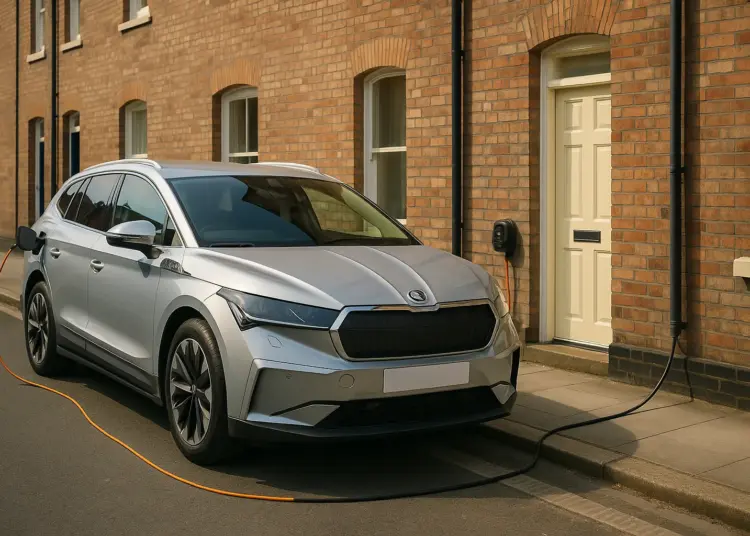Story Highlight
– Kristian Lewin-Petrov faces charging issues with his EV.
– Local council denied cross-pavement charging installation request.
– Public charging costs significantly more than home charging.
– Government plans consultation to ease EV charging regulations.
– 40% of UK homes lack off-street parking for EVs.
Full Story
In York, a local resident, Kristian Lewin-Petrov, has encountered unexpected challenges after making the switch from a diesel vehicle to an electric alternative. The 45-year-old believed that adopting an electric Skoda Enyaq SUV would not only benefit the environment but also ease his family’s financial burden. However, his experience has turned out to be quite the opposite, primarily due to local council regulations regarding electric vehicle (EV) charging infrastructure.
Mr Lewin-Petrov’s situation is particularly complex, as he resides in a terraced home that lacks a driveway. He had anticipated charging his vehicle affordably by running a cable from his property to the pavement. Unfortunately, the York City Council has denied his request to install a cross-pavement charging gully—a recessed channel in the pavement that would allow him to safely run a charging cable to the roadway—citing health and safety concerns.
This decision has forced him to rely entirely on public charging stations, which he says are significantly more expensive than domestic charging rates. Over a three-week period, Mr Lewin-Petrov estimates he has spent an additional £100 on charging compared to what he would have paid for his previous diesel vehicle to cover the same distance.
Recent data reveals a widening gap in EV ownership across the UK, largely depending on whether households have access to off-street parking. According to the Department for Transport, approximately nine in ten current EV owners can charge their vehicles at home, and 75% possess a dedicated parking space. In stark contrast, around 10 million people living in flats and terraced homes, like Mr Lewin-Petrov, lack suitable access to home charging options, compelling them to rely on the typically costlier public charging network.
As the latest AA Recharge Report illustrates, home charging costs about 5.88p per mile—a stark contrast to the much higher rates faced by those reliant on public stations, with some costing as much as 17.63p per mile for super-fast chargers. The disparities in pricing are compounded by differing tax rates: public charging incurs a 20% VAT compared to just 5% on domestic electricity, an inequity that the motor industry advocates to rectify.
In light of his difficulties, Mr Lewin-Petrov expressed frustration with the council’s refusal to approve the charging gully, citing that similar projects have been greenlit in multiple other local authorities. “I approached the council about new technology enabling me to charge my car from home,” he explained. He highlighted that the installation would not only be safer for pedestrians, given the self-closing lid of the gully but would also mitigate his financial challenges associated with public charging.
The City of York Council, however, remains cautious. Tom Horner, the head of active and sustainable transport, mentioned that ongoing reviews since 2020 have raised multiple concerns regarding electrical safety compliance and road safety implications. While some councillors appear open to the idea of embracing new charging technologies, the council’s current stance necessitates further scrutiny of the proposed installation methods.
The reluctance of local authorities to embrace cross-pavement charging may have broader implications for the UK’s environmental ambitions. With nearly 40% of households lacking driveways, the transition to electric vehicles may prove impractical for a significant portion of the population, potentially undermining government ambitions regarding Net Zero targets.
In an effort to address this issue, government ministers have indicated plans to launch a consultation aimed at simplifying the process for installing cross-pavement charging points. This would enable homeowners to bypass the need for planning permission, potentially saving them substantial application fees and expediting the process for gaining access to home charging.
Furthermore, Ministerial discussions include partnerships with Ofgem to ensure fair pricing in public charging and to provide safeguards against landowners charging excessive rates to residents for home charging. Transport Secretary Heidi Alexander noted that the forthcoming measures aim to enhance EV infrastructure throughout the country and facilitate affordable home charging for a broader range of households.
Critics like Liberal Democrat Baroness Pidgeon have pointed out that the costs associated with public charging can often be quite prohibitive, further incentivising the need for accessible charging solutions. There are calls for cross-pavement charging installations to be made easier and faster, a potential lifeline for residents who currently face economic disincentives in transitioning to electric vehicles.
As discussions continue in Parliament about these possible reforms, industry representatives urge the government to act swiftly to unlock charging options that would allow residents like Mr Lewin-Petrov to enjoy the full benefits of electric vehicle ownership without incurring disproportionate costs. The resolution of these regulatory obstacles could pave the way for a more inclusive and environmentally sustainable future in the realm of electric mobility.























This highlights a real accessibility and equity issue in the transition to electric vehicles. Many residents in terraced housing cannot use standard home charging and rely on public chargers that are often more expensive and less convenient. Local planning rules that prevent pragmatic solutions such as pavement to driveway charging installations risk penalising those without off street parking and slowing uptake of cleaner transport. Councils should work with residents and developers to enable safe, reasonable charging options while maintaining pedestrian safety, and central government guidance and funding need to support faster, fairer roll out so EV ownership does not become a privilege only for those with driveways.
This highlights a practical barrier to fair access to electric vehicle ownership. If a large portion of households cannot install chargers at home and public charging is more expensive and less convenient, the cost and convenience burden falls unevenly on them. Local authorities should adopt consistent, enabling policies that balance pavement safety with clear, proportionate permitting for charging solutions. National guidance and funding support for kerbside and onstreet charging would help ensure the transition to cleaner transport is inclusive rather than penalising those without driveways.
Denying practical charging options for people who cannot park off street creates a real barrier to EV adoption and shifts costs onto those least able to bear them. Councils should prioritise equitable access to charging by updating policies to allow safe, well designed pavement installations where needed and by working with residents to manage safety and accessibility concerns. National guidance and funding that make clear standards and responsibilities will help councils act consistently and avoid punishing drivers who want to switch to cleaner transport.
This highlights a practical barrier to wider EV adoption. For many households without off street parking, home charging is not an option and requiring public infrastructure or expensive alternatives undermines the financial and environmental case for switching to electric. Councils should work with residents to find safe, equitable solutions that do not simply transfer costs to those least able to afford them, while national policy needs to clarify permissions and funding so local authorities can enable accessible charging for all.